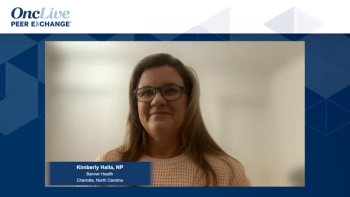
Nurse Practitioners Kathleen Lutz and Kimberly Halla describe the conversations they have with patients with advanced endometrial cancer before and after diagnosis and the common questions they hear.


Dostarlimab Improves Progression-Free Survival in Advanced or Recurrent Endometrial Cancer

Nurse Practitioners Kathleen Lutz and Kimberly Halla describe the conversations they have with patients with advanced endometrial cancer before and after diagnosis and the common questions they hear.

Kimberly Halla, NP, explains the staging of endometrial cancer and the standards for biomarker testing at her institution.

Kimberly A. Spickes, CNP, gives an overview of the typical symptoms women with endometrial cancer present with, discusses how these symptoms are similar and different from those seen with other gynecologic malignancies, and reviews risk factors for endometrial cancer.

A combination of the aromatase inhibitor letrozole and the CDK4/6 inhibitor abemaciclib may help patients with recurrent estrogen receptor–positive endometrial cancer achieve responses.

Intense-modulated therapy was associated with less patient-reported toxicities than conventional radiotherapy and demonstrated a comparable efficacy profile.

Courtney Arn, APRN-CNP, a nurse practitioner comments on the recent approval of pembrolizumab for patients with MSI-H/dMMR advanced endometrial carcinoma.

Courtney Arn, APRN-CNP, a nurse practitioner who supported cohorts D and K of the KEYNOTE-158 study, discusses the recent approval of pembrolizumab for patients with MSI-H/dMMR advanced endometrial carcinoma.

Selinexor demonstrated impressive efficacy in extending progression-free survival among patient with advanced or recurrent endometrial cancer, particularly among patients with wild-type p53 endometrial cancer.

Selinexor, an oral selective inhibitor of nuclear export, demonstrated promising efficacy in increasing progression-free survival among women with advanced endometrial cancer.

An expert from the University of Colorado (UC Health) comments on ongoing clinical trials which promise to shake up the treatment paradigm of endometrial cancer.

An expert from the Ohio State University Comprehensive Cancer Center discusses whether predictive biomarkers hold the potential to change endometrial prognoses.

A presentation at the 2021 Society for Immunotherapy of Cancer (SITC) Annual Meeting shared updated findings on the efficacy of lenvatinib plus pembrolizumab in patients with advanced endometrial cancer.

An expert from NYU Langone outlines how checkpoint blockade approvals have helped advance endometrial cancer management.

Patients with endometrial cancer and high tumor mutational burden experienced superior overall response rates to the agent dostarlimab than patients with low mutational burden.

After the 3-arm, JAVELIN Ovarian 100 trial terminated at the interim analysis, researchers concluded that avelumab is not yet a suitable first-line treatment option for patients with advanced epithelial cancer.

Adherence to current clinical guidelines may contribute to systematic underdiagnosis in Black women, says Kemi M. Doll, MD, MS.

The regulatory decision is based on findings from collective data from the dMMR endometrial cancer cohort A1 and the dMMR solid-tumor, non-endometrial cancer, cohort F of the ongoing phase 1 GARNET trial (NCT02715284).

The FDA approved dostarlimab (Jemperli) for the treatment of patients with recurrent or advanced endometrial cancer that progressed on or after platinum-containing chemotherapy and whose cancer is DNA mismatch repair deficient (dMMR), as determined by an FDA-approved test.

A reduction in patient-reported symptomatic adverse events (AEs) was observed with intensity-modulated radiotherapy (IMRT) compared with standard radiotherapy in patients with cervical or endometrial cancer, whereas no difference was observed with regard to clinician-reported AE.

Retrospective results showed that African-American women with endometrial cancer are less likely to receive evidence-based care compared with white women.

The FDA has granted accelerated approval to the combination of lenvatinib and pembrolizumab in the treatment of patients with advanced endometrial carcinoma.

The FDA approved entrectinib for pediatric and adult patients with certain subtypes of solid tumors, including non-small cell lung cancer.

The FDA has granted a second breakthrough therapy designation to the combination use of lenvatinib (Lenvima) and pembrolizumab (Keytruda) for the treatment of patients with advanced and/or metastatic non–microsatellite instability high (MSI-H)/proficient mismatch repair endometrial carcinoma who have progressed after ≥1 prior systemic therapy.


A study done at SUNY Downstate Hospital found that black women of Caribbean descent with type I or type II endometrial cancer expressed significant differences in genetic variations when compared with a nationwide population of patients with endometrial cancer.